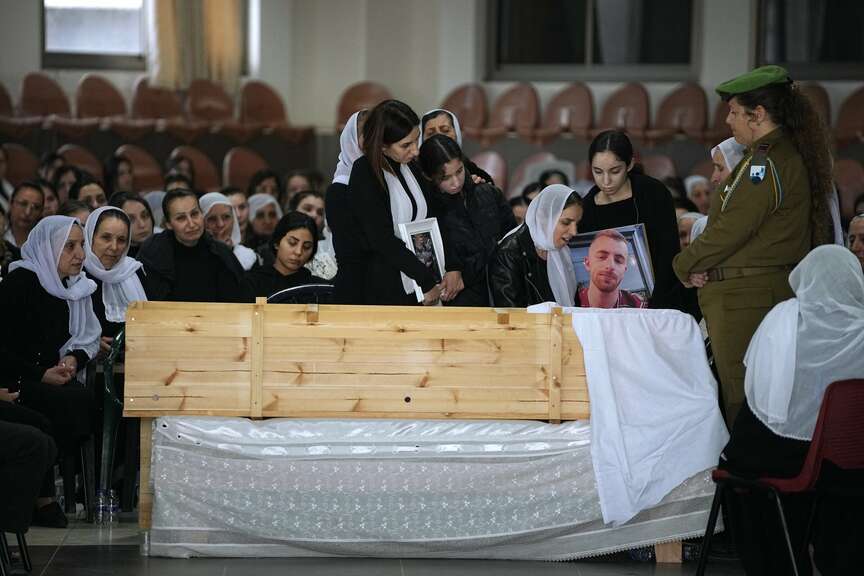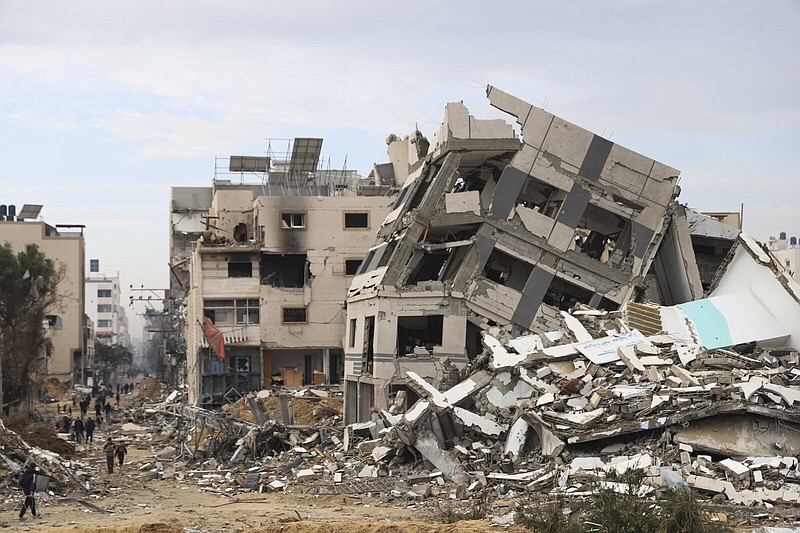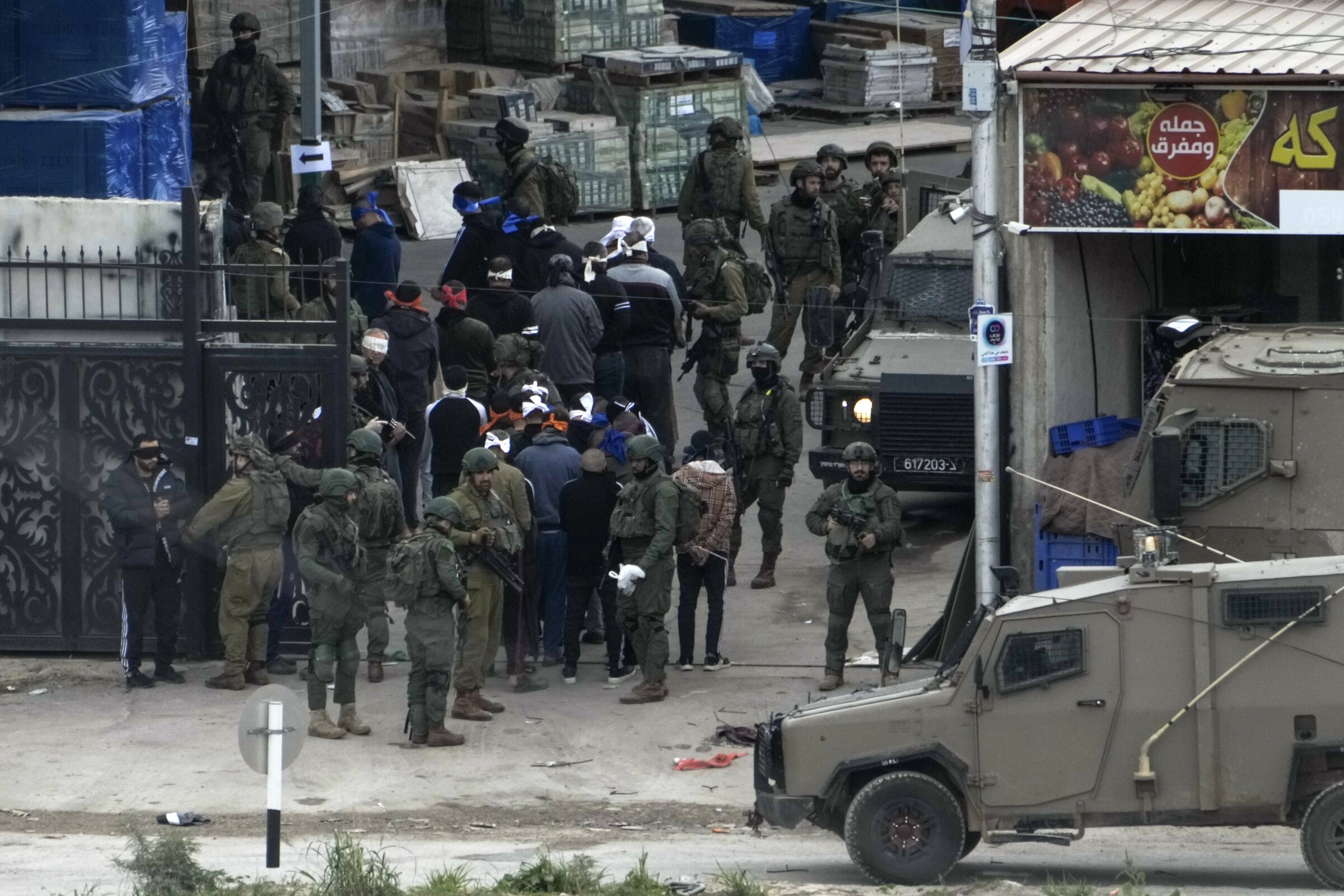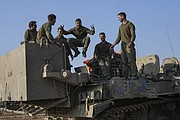JERUSALEM -- The chief of Israel's Mossad intelligence service vowed Wednesday that the agency would hunt down every Hamas member involved in the Oct. 7 attack on Israel, no matter where they are. His pledge came a day after the deputy head of the Palestinian militant group was killed in a suspected Israeli strike in Beirut.
Israel has refused to comment on reports it carried out the killing, but the remarks by David Barnea appeared to be the strongest indication yet it was behind the blast. He made a comparison to the aftermath of the slayings at the Munich Olympics in 1972, when Mossad agents tracked down and killed Palestinian militants involved in killing Israeli athletes.
Israel was on high alert Wednesday for an escalation with Lebanon's powerful Hezbollah militia after the strike in the Lebanese capital killed Saleh Arouri, the most senior Hamas member slain since the war in Gaza erupted nearly three months ago.
The strike in Hezbollah's southern Beirut stronghold could cause the low-intensity fighting along the Lebanon border to boil over into all-out war.
In a speech Wednesday evening, Hezbollah leader Hassan Nasrallah promised revenge, repeating his group's statement that "this dangerous crime" of Arouri's killing will not go "without response and without punishment." But he left the audience guessing as to when and in what form.
Nasrallah said Hezbollah had so far been careful in its strategic calculus in the conflict, balancing "the need to support Gaza and to take into account Lebanese national interests." But if the Israelis launch a war on Lebanon, the group is ready for a "fight without limits."
"They will regret it," he said. "It will be very, very, very costly."
Arouri's killing provided a morale boost for Israelis still reeling from the Oct. 7 attack as the militants continue to put up stiff resistance in Gaza and hold scores of hostages.
Barnea said the Mossad is "committed to settling accounts with the murderers who raided the Gaza envelope," referring to the area of southern Israel that Hamas attacked. He vowed to pursue everyone involved, "directly or indirectly," including "planners and envoys."
"It'll take time, as it took time after the Munich massacre, but we will put our hands on them wherever they are," he said. Barnea was speaking at the funeral of former Mossad head Zvi Zamir, who died at age 98 a day earlier.
Zamir headed the intelligence agency at the time of the Munich attack, in which Palestinian militants killed 11 members of the Israeli Olympic delegation. Israel subsequently killed members of the Black September militant group who carried out the attack.
HEZBOLLAH FOCUS
Hezbollah and the Israeli military have been exchanging fire almost daily over the Israeli-Lebanese border since the war in Gaza began. But Nasrallah has appeared reluctant to escalate it further, perhaps fearing a repeat of the monthlong 2006 war, when Israel heavily bombed Beirut and southern Lebanon.
At the same time, Hezbollah also faces pressure to show support for its ally Hamas.
Nasrallah's comments on balancing interests reflected the group's wariness of being blamed by Lebanon if its exchanges with Israel spiral into an all-out war that brings destruction similar to the 2006 war. He avoided specifics on any possible reprisal for Arouri's killing, though he said he would address the issue further in a speech Friday.
But he said if Israel attacks Lebanon, it would be in the national interest to fight back. "We are not afraid of war," he said. "If the enemy thinks about launching a war against Lebanon, then we will fight back without ceilings and without limits."
Hezbollah boasts an arsenal of tens of thousands of rockets and missiles as well as different types of drones. The United States has sought to prevent any widening of the conflict, including by deploying two aircraft carriers and other military assets to the region. Secretary of State Antony Blinken was expected in the region this week.
Nasrallah praised Arouri as well as the group's Oct. 7, attack, saying it "brought light back onto the Palestinian cause after it was nearly forgotten." He said Israel has so far failed in all its objectives in the Gaza war and was suffering damage to its international reputation.
The Israeli military chief of staff, Lt. Col. Herzi Halevi, visited Israel's northern border with Lebanon on Wednesday, saying "We are on high readiness in the north."
Hamas leaders clearly expect Hezbollah to have its back.
In an interview Saturday, three days before Arouri's killing, The Associated Press asked Beirut-based Hamas political official Osama Hamdan if the group was worried about the possibility of Israel assassinating its officials in Lebanon.
Hamdan predicted that Hezbollah would not let that go unpunished, and an all-out war would ensue.
"So why would Israel want to do that? Does it want a war" in Lebanon? he asked. "War can happen if Israel acts wrongly and aggressively," or war might not occur "if Israel takes a step back and acts in a way that is not aggressive against Lebanon."
In what appeared to be an escalation, Hezbollah said Wednesday nine of its fighters were killed in Israeli strikes in Lebanon, among the highest daily death tolls in nearly three months of clashes.
Hezbollah also announced that its fighters carried out 11 attacks against Israeli posts along the border, including four using heavy warhead Burkan rockets, which the group has rarely fired during the current conflict. The statement did not directly link the fire to Arouri's killing.
Arouri was the deputy of Hamas' supreme political leader, Ismail Haniyeh, and headed the group's presence in the Israeli-occupied West Bank. He was also a key liaison with Hezbollah.
A U.S. official confirmed that the Israeli military carried out the strike that killed Arouri and did not give the White House advance notice. The official spoke on the condition of anonymity because they were not authorized to discuss the operation.
The strike would be the first time since the war that Israel has reached into another country to target Hamas leaders, many of whom live in exile around the region.
The Mossad chief's comments suggested more assassinations of Hamas figures were to come, echoing threats by Prime Minister Benjamin Netanyahu to kill Hamas leaders wherever they are. Hamas's Oct. 7 attack from Gaza into southern Israel killed around 1,200 people, and some 240 others were taken hostage.
'CLEAR VICTORY'
The focus of the war remains on Gaza, where Israeli Defense Minister Yoav Gallant said Israel is seeking a "clear victory" over Hamas, which has ruled the territory since 2007.
Israel's air, ground and sea assault in Gaza has killed more than 22,100 people, two-thirds of them women and children, according to the Health Ministry in the Hamas-ruled territory. The count does not differentiate between civilians and combatants.
The campaign has driven some 85% of Gaza's population from their homes, forcing hundreds of thousands of people into overcrowded shelters or teeming tent camps in Israeli-designated safe areas that the military has nevertheless bombed.
A quarter of Gaza's population face starvation, according to the United Nations, as Israeli restrictions and heavy fighting hinder aid delivery.
Still, Israel appears far from achieving its goals of crushing Hamas and returning the estimated 129 hostages still held by the group.
Gallant said several thousand Hamas fighters remain in northern Gaza, where Israeli troops have been battling militants for over two months and where entire neighborhoods have been blasted into rubble.
Heavy fighting is also underway in central Gaza and the southern city of Khan Younis, where Israeli officials say Hamas' military structure is still largely intact. Yehya Sinwar, Hamas' top leader in Gaza, and his deputies have thus far eluded Israeli forces.
U.N. associate spokesperson Florencia Soto Niño said officials from the U.N.'s humanitarian office and the World Health Organization visited the Al Amal hospital in Khan Younis on Tuesday, which was reportedly hit by a deadly strike, and witnessed extensive damage.
The U.N. and its humanitarian partners have been unable to deliver aid to northern Gaza for three days, Soto Niño said.
The U.N. humanitarian office has warned that "Gaza is a public health disaster in the making," she said.
Since Oct. 7, more than 400,000 cases of infectious diseases have been reported, Soto Niño said, including some 180,000 people with upper respiratory infections and over 136,000 cases of diarrhea -- half among children under the age of 5.
HAMAS' HOSPITAL USE
The U.S. is "confident" that Palestinian militant groups used Gaza's largest hospital to hold "at least a few" hostages seized during their bloody Oct. 7 attack and to house command infrastructure, an American intelligence assessment declassified Tuesday and shared by a U.S. official found.
The assessment offers the firmest U.S. support for Israeli claims about the Shifa hospital complex, which was raided by Israeli forces in November in an operation decried by global humanitarian organizations and some members of President Joe Biden's party. Yet the information released doesn't fully back some of Israel's most significant allegations that the hospital served as the central node for activities by Hamas and Palestinian Islamic Jihad. The U.S. official shared the assessment on the condition of anonymity.
"The U.S. Intelligence Community is confident in its judgment on this topic and has independently corroborated information on HAMAS and PIJ's use of the hospital complex for a variety of purposes related to its campaign against Israel," the assessment states. It continues that it believes the groups "used the al-Shifa hospital complex and sites beneath it to house command infrastructure, exercise certain command and control activities, store some weapons, and hold at least a few hostages."
The U.S. believes that Hamas members evacuated days before Israel raided the complex on Nov. 15 and that they destroyed sensitive documents and electronics before Israeli troops entered the facility.
U.S. officials had previously pointed to classified intelligence, obtained independently from the Israelis, to offer support for Israel's raid.
"I can confirm for you that we have information that Hamas and the Palestinian Islamic Jihad use some hospitals in the Gaza Strip, including al-Shifa, and tunnels underneath them to conceal and to support their military operations and to hold hostages," National Security Council spokesman John Kirby told reporters a day before Israel entered the hospital.
Gaza's hospitals have played a central role in the dueling narratives surrounding the war that the Hamas-run Health Ministry says has killed 22,100 people -- though it does not differentiate between civilians and combatants. Hospitals enjoy special protected status under the international laws of war. But they can lose that status if they are used for military purposes.
Before the raid on the hospital, the Israeli military unveiled a detailed 3D model of Gaza's Shifa Hospital showing a series of underground installations that it said was part of an elaborate Hamas command-and-control center under the territory's largest health care facility. The Israeli military has yet to unveil any infrastructure nearly as sprawling and developed as the purported center.
Information for this article was contributed by Tia Goldenberg, Fadi Tawil, Samy Magdy, Abby Sewell, Bassem Mroue, Tara Copp, Edith M. Lederer and Zeke Miller of The Associated Press.
 Mourners gather around the flag-draped casket of Israeli soldier Staff Sgt. Sufian Dagash during his funeral in the village of Maghar, northern Israel, Wednesday, Jan. 3, 2024. Dagash, 21, a member of the Druze minority, was killed during Israel's ground operation in the Gaza Strip, where the Israeli army has been battling Palestinian militants in the war ignited by Hamas' Oct. 7 attack on Israel. (AP Photo/Ohad Zwigenberg)
Mourners gather around the flag-draped casket of Israeli soldier Staff Sgt. Sufian Dagash during his funeral in the village of Maghar, northern Israel, Wednesday, Jan. 3, 2024. Dagash, 21, a member of the Druze minority, was killed during Israel's ground operation in the Gaza Strip, where the Israeli army has been battling Palestinian militants in the war ignited by Hamas' Oct. 7 attack on Israel. (AP Photo/Ohad Zwigenberg)

